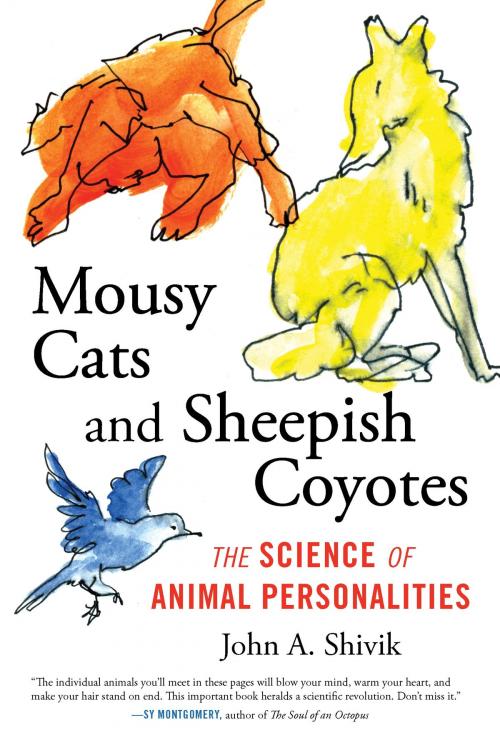Mousy Cats and Sheepish Coyotes
The Science of Animal Personalities
Nonfiction, Science & Nature, Nature, Animals, Home & Garden, Pets| Author: | John Shivik | ISBN: | 9780807071526 |
| Publisher: | Beacon Press | Publication: | November 7, 2017 |
| Imprint: | Beacon Press | Language: | English |
| Author: | John Shivik |
| ISBN: | 9780807071526 |
| Publisher: | Beacon Press |
| Publication: | November 7, 2017 |
| Imprint: | Beacon Press |
| Language: | English |
A wildlife expert explores what science tells us about animals as unique individuals and why animal personality matters for the human-animal bond and for adaptation in nature.
Why are some cats cuddly and others standoffish? Why are some dogs adventuresome, others homebodies? As any pet owner can attest, we feel that the animals we’ve formed bonds with are unique, as particular (and peculiar) as any human friend or loved one.
Recent years have brought an increased understanding of animal intelligence and emotion. But is there a scientific basis for animal personality and individuality, or is this notion purely sentimental? It turns out that science has been reluctant to even broach the subject of individuality until recently. But now, a fundamental shift in scientific understanding is underway, as mainstream scientists begin to accept the idea that animals of all kinds—from beloved beasts like apes and birds to decidedly less cuddly creatures like crabs and spiders—do indeed have individual personalities.
In Mousy Cats and Sheepish Coyotes, veteran wildlife expert Dr. John A. Shivik brings us stories from the front lines of this exciting new discipline. Drawing on his scientific training, as well as his storytelling gifts, Shivik serves as an accessible, humorous guide to the emerging body of research on animal personalities. Shivik accompanies researchers who are discovering that each wolf, bear, and coyote has an inherent tendency to favor either its aggressive nature or to shyly avoid conflicts. Some bluebirds are lovers, others are fighters. And some spiders prefer to be loners, while others are sociable. Unique personalities can be discovered in every corner of the animal kingdom—even among microscopic organisms. The array of personality types among all species is only beginning to be described and understood.
As Shivik argues, animals’ unique personalities are important not only because they determine which animals we bond with. Individual animal traits are also fundamental but still inadequately understood drivers of evolution, adaptation, and species diversity. Ultimately, Mousy Cats and Sheepish Coyotes offers insight into the similarities humans share with animals and presents evidence of an unbroken biological connection from the smallest organisms to Homo sapiens.
A wildlife expert explores what science tells us about animals as unique individuals and why animal personality matters for the human-animal bond and for adaptation in nature.
Why are some cats cuddly and others standoffish? Why are some dogs adventuresome, others homebodies? As any pet owner can attest, we feel that the animals we’ve formed bonds with are unique, as particular (and peculiar) as any human friend or loved one.
Recent years have brought an increased understanding of animal intelligence and emotion. But is there a scientific basis for animal personality and individuality, or is this notion purely sentimental? It turns out that science has been reluctant to even broach the subject of individuality until recently. But now, a fundamental shift in scientific understanding is underway, as mainstream scientists begin to accept the idea that animals of all kinds—from beloved beasts like apes and birds to decidedly less cuddly creatures like crabs and spiders—do indeed have individual personalities.
In Mousy Cats and Sheepish Coyotes, veteran wildlife expert Dr. John A. Shivik brings us stories from the front lines of this exciting new discipline. Drawing on his scientific training, as well as his storytelling gifts, Shivik serves as an accessible, humorous guide to the emerging body of research on animal personalities. Shivik accompanies researchers who are discovering that each wolf, bear, and coyote has an inherent tendency to favor either its aggressive nature or to shyly avoid conflicts. Some bluebirds are lovers, others are fighters. And some spiders prefer to be loners, while others are sociable. Unique personalities can be discovered in every corner of the animal kingdom—even among microscopic organisms. The array of personality types among all species is only beginning to be described and understood.
As Shivik argues, animals’ unique personalities are important not only because they determine which animals we bond with. Individual animal traits are also fundamental but still inadequately understood drivers of evolution, adaptation, and species diversity. Ultimately, Mousy Cats and Sheepish Coyotes offers insight into the similarities humans share with animals and presents evidence of an unbroken biological connection from the smallest organisms to Homo sapiens.















